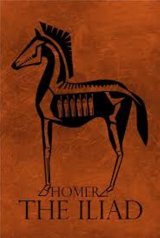Iliad Page #2
The Iliad is an ancient Greek epic poem in dactylic hexameter, traditionally attributed to Homer. Set during the Trojan War, the ten-year siege of the city of Troy (Ilium) by a coalition of Greek states, it tells of the battles and events during the weeks of a quarrel between King Agamemnon and the warrior Achilles.
Not e'en the chief by whom our hosts are led, The king of kings, shall touch that sacred head." Encouraged thus, the blameless man replies: "Nor vows unpaid, nor slighted sacrifice, But he, our chief, provoked the raging pest, Apollo's vengeance for his injured priest. Nor will the god's awaken'd fury cease, But plagues shall spread, and funeral fires increase, Till the great king, without a ransom paid, To her own Chrysa send the black-eyed maid.(54) Perhaps, with added sacrifice and prayer, The priest may pardon, and the god may spare." The prophet spoke: when with a gloomy frown The monarch started from his shining throne; Black choler fill'd his breast that boil'd with ire, And from his eye-balls flash'd the living fire: "Augur accursed! denouncing mischief still, Prophet of plagues, for ever boding ill! Still must that tongue some wounding message bring, And still thy priestly pride provoke thy king? For this are Phoebus' oracles explored, To teach the Greeks to murmur at their lord? For this with falsehood is my honour stain'd, Is heaven offended, and a priest profaned; Because my prize, my beauteous maid, I hold, And heavenly charms prefer to proffer'd gold? A maid, unmatch'd in manners as in face, Skill'd in each art, and crown'd with every grace; Not half so dear were Clytaemnestra's charms, When first her blooming beauties bless'd my arms. Yet, if the gods demand her, let her sail; Our cares are only for the public weal: Let me be deem'd the hateful cause of all, And suffer, rather than my people fall. The prize, the beauteous prize, I will resign, So dearly valued, and so justly mine. But since for common good I yield the fair, My private loss let grateful Greece repair; Nor unrewarded let your prince complain, That he alone has fought and bled in vain." "Insatiate king (Achilles thus replies), Fond of the power, but fonder of the prize! Would'st thou the Greeks their lawful prey should yield, The due reward of many a well-fought field? The spoils of cities razed and warriors slain, We share with justice, as with toil we gain; But to resume whate'er thy avarice craves (That trick of tyrants) may be borne by slaves. Yet if our chief for plunder only fight, The spoils of Ilion shall thy loss requite, Whene'er, by Jove's decree, our conquering powers Shall humble to the dust her lofty towers." Then thus the king: "Shall I my prize resign With tame content, and thou possess'd of thine? Great as thou art, and like a god in fight, Think not to rob me of a soldier's right. At thy demand shall I restore the maid? First let the just equivalent be paid; Such as a king might ask; and let it be A treasure worthy her, and worthy me. Or grant me this, or with a monarch's claim This hand shall seize some other captive dame. The mighty Ajax shall his prize resign;(55) Ulysses' spoils, or even thy own, be mine. The man who suffers, loudly may complain; And rage he may, but he shall rage in vain. But this when time requires.--It now remains We launch a bark to plough the watery plains, And waft the sacrifice to Chrysa's shores, With chosen pilots, and with labouring oars. Soon shall the fair the sable ship ascend, And some deputed prince the charge attend: This Creta's king, or Ajax shall fulfil, Or wise Ulysses see perform'd our will; Or, if our royal pleasure shall ordain, Achilles' self conduct her o'er the main; Let fierce Achilles, dreadful in his rage, The god propitiate, and the pest assuage." [Illustration: MARS.] MARS. At this, Pelides, frowning stern, replied: "O tyrant, arm'd with insolence and pride! Inglorious slave to interest, ever join'd With fraud, unworthy of a royal mind! What generous Greek, obedient to thy word, Shall form an ambush, or shall lift the sword? What cause have I to war at thy decree? The distant Trojans never injured me; To Phthia's realms no hostile troops they led: Safe in her vales my warlike coursers fed; Far hence removed, the hoarse-resounding main, And walls of rocks, secure my native reign, Whose fruitful soil luxuriant harvests grace, Rich in her fruits, and in her martial race. Hither we sail'd, a voluntary throng, To avenge a private, not a public wrong: What else to Troy the assembled nations draws, But thine, ungrateful, and thy brother's cause? Is this the pay our blood and toils deserve; Disgraced and injured by the man we serve? And darest thou threat to snatch my prize away, Due to the deeds of many a dreadful day? A prize as small, O tyrant! match'd with thine, As thy own actions if compared to mine. Thine in each conquest is the wealthy prey, Though mine the sweat and danger of the day. Some trivial present to my ships I bear: Or barren praises pay the wounds of war. But know, proud monarch, I'm thy slave no more; My fleet shall waft me to Thessalia's shore: Left by Achilles on the Trojan plain, What spoils, what conquests, shall Atrides gain?" To this the king: "Fly, mighty warrior! fly; Thy aid we need not, and thy threats defy. There want not chiefs in such a cause to fight, And Jove himself shall guard a monarch's right. Of all the kings (the god's distinguish'd care) To power superior none such hatred bear: Strife and debate thy restless soul employ, And wars and horrors are thy savage joy, If thou hast strength, 'twas Heaven that strength bestow'd; For know, vain man! thy valour is from God. Haste, launch thy vessels, fly with speed away; Rule thy own realms with arbitrary sway; I heed thee not, but prize at equal rate Thy short-lived friendship, and thy groundless hate. Go, threat thy earth-born Myrmidons:--but here(56) 'Tis mine to threaten, prince, and thine to fear. Know, if the god the beauteous dame demand, My bark shall waft her to her native land; But then prepare, imperious prince! prepare, Fierce as thou art, to yield thy captive fair: Even in thy tent I'll seize the blooming prize, Thy loved Briseis with the radiant eyes. Hence shalt thou prove my might, and curse the hour Thou stood'st a rival of imperial power; And hence, to all our hosts it shall be known, That kings are subject to the gods alone." Achilles heard, with grief and rage oppress'd, His heart swell'd high, and labour'd in his breast; Distracting thoughts by turns his bosom ruled; Now fired by wrath, and now by reason cool'd: That prompts his hand to draw the deadly sword, Force through the Greeks, and pierce their haughty lord; This whispers soft his vengeance to control, And calm the rising tempest of his soul. Just as in anguish of suspense he stay'd, While half unsheathed appear'd the glittering blade,(57) Minerva swift descended from above, Sent by the sister and the wife of Jove
Translation
Translate and read this book in other languages:
Select another language:
- - Select -
- 简体中文 (Chinese - Simplified)
- 繁體中文 (Chinese - Traditional)
- Español (Spanish)
- Esperanto (Esperanto)
- 日本語 (Japanese)
- Português (Portuguese)
- Deutsch (German)
- العربية (Arabic)
- Français (French)
- Русский (Russian)
- ಕನ್ನಡ (Kannada)
- 한국어 (Korean)
- עברית (Hebrew)
- Gaeilge (Irish)
- Українська (Ukrainian)
- اردو (Urdu)
- Magyar (Hungarian)
- मानक हिन्दी (Hindi)
- Indonesia (Indonesian)
- Italiano (Italian)
- தமிழ் (Tamil)
- Türkçe (Turkish)
- తెలుగు (Telugu)
- ภาษาไทย (Thai)
- Tiếng Việt (Vietnamese)
- Čeština (Czech)
- Polski (Polish)
- Bahasa Indonesia (Indonesian)
- Românește (Romanian)
- Nederlands (Dutch)
- Ελληνικά (Greek)
- Latinum (Latin)
- Svenska (Swedish)
- Dansk (Danish)
- Suomi (Finnish)
- فارسی (Persian)
- ייִדיש (Yiddish)
- հայերեն (Armenian)
- Norsk (Norwegian)
- English (English)
Citation
Use the citation below to add this book to your bibliography:
Style:MLAChicagoAPA
"Iliad Books." Literature.com. STANDS4 LLC, 2025. Web. 20 Jan. 2025. <https://www.literature.com/book/iliad_28>.




Discuss this Iliad book with the community:
Report Comment
We're doing our best to make sure our content is useful, accurate and safe.
If by any chance you spot an inappropriate comment while navigating through our website please use this form to let us know, and we'll take care of it shortly.
Attachment
You need to be logged in to favorite.
Log In